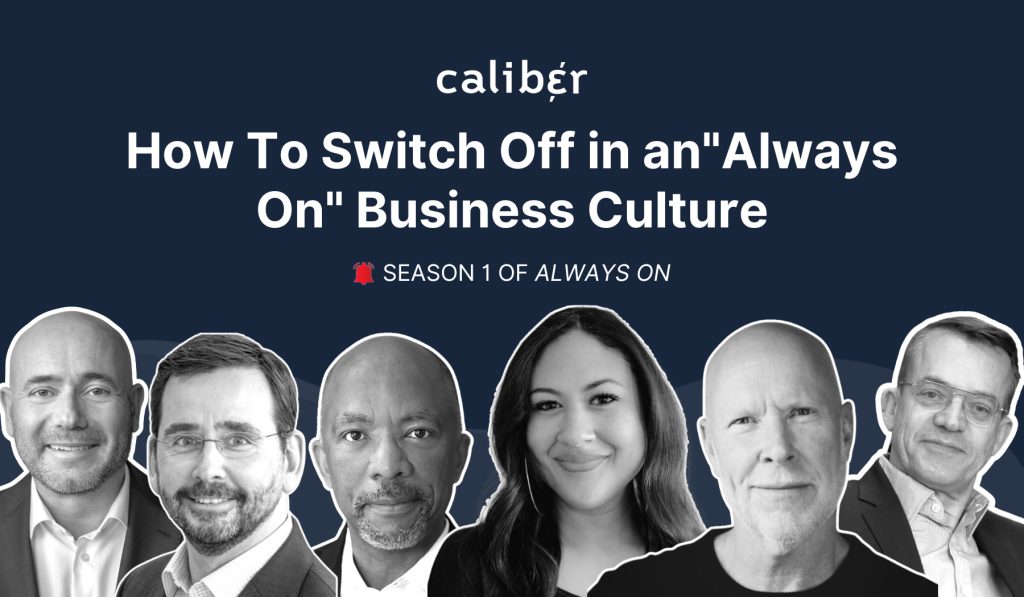

On our aptly named podcast, we invited guests to discuss how they navigate the challenge of balancing their work and personal life — and staying healthy — in a hyper-connected world.
In a business landscape that prizes constant availability, finding ways to truly “switch off” can feel like an impossible task. Yet, as we heard in the first season of ‘Always On’, brand and communications leaders emphasize the importance of disconnecting, recharging, and setting boundaries to maintain mental, emotional, and physical well-being.
For many professionals, learning to draw a firm line between work and personal time is essential. Medtronic’s Chief Communications Officer, Torod Neptune, reflects on the lessons of the pandemic, which provided an opportunity to recalibrate priorities. “The pandemic forced many of us to put mental health first and work second,” he notes, emphasizing the importance of boundaries.
Neptune ensures that weekends are truly “weekends, not ‘workends,'” and encourages his team to adopt the same philosophy. “When I’m off, I’m actually off. That’s the expectation for my team as well.”
This clear separation helps reinforce a healthier work culture, where colleagues are discouraged from reaching out during vacations or off-hours. Neptune believes that leaders must model this behavior to cultivate a culture of respect for personal time.
For Kim Larsen, CCO at Dutch bank ING, switching off is about shifting focus to activities that engage the mind and spirit. A fan of storytelling, he often turns to podcasts and books—especially fiction—as a way to immerse himself in narratives that differ from the corporate or political worlds. “Fiction is important,” he says. “It helps you think about things differently and exposes you to other ways of thinking.”
Traveling is another way Larsen disconnects. Exploring different cultures not only provides a sense of adventure but also offers new perspectives. “The world is a beautiful place, and meeting people in other parts of it always teaches you something new,” he shares, adding that these experiences are invaluable, particularly for someone working in a global company.
For Ben Boyd, when he was CCO at Chobani and is now on sabbatical, “disconnecting” involved trading the fast pace of Manhattan for the tranquility of rural life.
He and his husband would retreat to their farm a couple of hours north of the city, where Boyd said he found solace in hands-on activities like gardening and tractor rides. “Being out in nature and quite literally in the dirt is cathartic,” he explains. This connection to the land provides not only physical and emotional relief but also a spiritual reset.
Boyd protects this time fiercely, too, saying that for him, the farm is more than a getaway—it’s a necessary retreat to maintain balance.
For Roberta Thomson, CCO at toy maker Hasbro, spending time with her six-year-old son offers a perfect escape from the work grind. Their trips to New York City, exploring toy stores and riding the subway, provide a sense of fun and connection that work emails can’t intrude upon. “When you’re one-on-one with your kids, you can’t really be thinking too much about work,” she says. These moments not only strengthen their bond but also recharge her energy for work.
Another way Thomson disconnects is through music. Playing the piano, even as an amateur, offers her a creative outlet where distractions fall away. “You can’t be checking emails while you’re playing,” she jokes, highlighting the immersive nature of the activity.
The rise of hybrid work and digital tools has blurred the lines between professional and personal life, but some leaders find solace in the agility these changes allow. Neptune describes the ability to switch on for urgent matters and then immediately switch off again, ensuring that work doesn’t bleed excessively into personal time. This flexibility is a skill that many professionals have cultivated as they navigate the always-on nature of modern work.
What stands out across these perspectives is the intentionality behind disconnecting. Whether it’s setting clear boundaries, engaging in hobbies, or reconnecting with nature and loved ones, these leaders show that stepping away from work isn’t just desirable—it’s essential. It allows them to return to their roles with greater focus, creativity, and resilience.
As organizations continue to demand more from their employees, setting these examples is crucial. By modeling healthy habits, leaders not only benefit themselves but also create cultures that respect and prioritize well-being. Whether through books, farm work, piano keys, or global adventures, switching off is less about avoidance and more about embracing the full spectrum of life outside work.